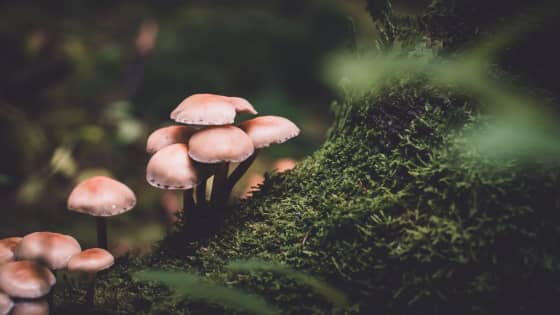Psilocybe Cubensis, commonly known as magic mushrooms, is a species of psychedelic fungi that has captivated human interest for centuries.
In this article, we will delve into the intricate details of Psilocybe Cubensis, exploring its taxonomy, physical characteristics, distribution, psychoactive compounds, cultural significance, potential benefits and risks, legal status, ethical considerations, and more.
Table of Contents
Taxonomy and Classification
Psilocybe Cubensis belongs to the Kingdom Fungi, the Phylum Basidiomycota, and the Class Agaricomycetes. Within the vast array of fungal species, Psilocybe Cubensis falls under the Genus Psilocybe and the species Cubensis.
Its common names include magic mushrooms, golden tops, cubes, and shrooms.
Morphology and Physical Characteristics
The distinct morphology of Psilocybe Cubensis offers a captivating sight. The caps of these mushrooms vary in shape and color, ranging from convex to bell-shaped and displaying hues of brown, tan, or reddish-brown.
The stems are slender and elongated, often featuring a whitish or pale yellow coloration. When it comes to spore color and size, Psilocybe Cubensis typically produces dark purplish-brown to black spores.
Distribution and Habitat
Psilocybe Cubensis thrives in diverse habitats across the globe. It shows a preference for humid environments, often being found in subtropical and tropical regions.
Its geographic range spans from South America to North America, including countries like Mexico, Brazil, Colombia, the United States, and more.
In terms of growing conditions, Psilocybe Cubensis can be found in various substrates such as dung, decaying organic matter, and enriched soils.
Psychoactive Compounds
The allure of Psilocybe Cubensis lies in its psychoactive compounds: psilocybin and psilocin. Psilocybin is a prodrug that is converted into psilocin within the body, leading to altered states of consciousness.
These compounds interact with serotonin receptors in the brain, producing profound effects on perception, mood, and cognition. Ongoing research indicates their potential in therapeutic applications, showing promise in the treatment of conditions such as depression, anxiety, and addiction.
Cultural and Historical Significance
Psilocybe Cubensis holds a rich cultural and historical significance. Indigenous cultures have long embraced the use of these mushrooms in their spiritual and religious practices. Ancient artifacts and artwork depict the reverence for Psilocybe Cubensis, highlighting its role in shamanic rituals and divination.
In contemporary times, Psilocybe Cubensis continues to influence various art forms, music, and countercultural movements, symbolizing introspection, enlightenment, and alternative perspectives.
Potential Benefits and Risks
The potential benefits of Psilocybe Cubensis extend beyond the realm of recreation. Many individuals report positive effects on mental well-being, describing enhanced creativity, increased mindfulness, and a greater sense of connectedness.
However, it is essential to consider the potential risks and adverse reactions associated with psychedelic experiences. Some individuals may experience anxiety, confusion, or challenging emotions during the trip.
Risks Associated with Psilocybe Cubensis
- Hallucinations: Psilocybe Cubensis can cause intense hallucinations, which may be distressing or overwhelming for some individuals.
- Bad Trips: The psychedelic effects of Psilocybe Cubensis can sometimes lead to negative experiences, characterized by anxiety, paranoia, and confusion.
- Emotional Instability: The use of Psilocybe Cubensis can amplify existing emotions and may lead to unpredictable mood swings or emotional instability during the trip.
- Accidental Ingestion: Mistakenly consuming poisonous mushrooms that resemble Psilocybe Cubensis can have severe health consequences. Proper identification is crucial.
- Risky Behavior: Under the influence of Psilocybe Cubensis, individuals may engage in risky behaviors or activities, potentially leading to accidents or harm.
- Psychological Vulnerability: People with underlying mental health conditions or a predisposition to psychosis may be at a higher risk of experiencing adverse psychological effects from Psilocybe Cubensis.
- Interaction with Medications: Psilocybe Cubensis can interact with certain medications, including antidepressants and antipsychotics, potentially causing adverse reactions or reducing their effectiveness.
- Flashbacks: Some individuals may experience recurring psychedelic effects or flashbacks from previous Psilocybe Cubensis trips, even after the effects have worn off.
- Impaired Judgment: The altered state of consciousness induced by Psilocybe Cubensis can impair judgment and decision-making abilities, leading to potentially risky or dangerous situations.
- Legal Consequences: Possessing or using Psilocybe Cubensis may be illegal in many jurisdictions, leading to legal consequences if caught or found in possession.
It is important to note that these risks can vary depending on the individual, dosage, setting, and overall physical and mental health.
It is advisable to approach the use of Psilocybe Cubensis with caution, research, and responsible guidance to minimize potential risks.
Legal Status and Regulations
The legal status of Psilocybe Cubensis varies across different countries and jurisdictions. While some nations have strict regulations prohibiting its use and possession, others have decriminalized or even legalized it for medical or therapeutic purposes.
As scientific research continues to shed light on its potential benefits, the legal landscape surrounding Psilocybe Cubensis is subject to change. It is essential to stay informed about the specific laws and regulations in your region.
Ethical Considerations
As we navigate the realm of Psilocybe Cubensis, it is crucial to address ethical considerations. Sustainability and conservation efforts play a significant role in ensuring the preservation of natural habitats and species.
Additionally, respecting indigenous knowledge and cultural heritage surrounding Psilocybe Cubensis is vital, as these mushrooms hold deep cultural significance for many communities. Responsible use and harm reduction practices are crucial for promoting safe and mindful psychedelic experiences.
Conclusion
In conclusion, Psilocybe Cubensis stands as a fascinating subject of study and exploration. From its taxonomy and physical characteristics to its cultural significance and therapeutic potential, Psilocybe Cubensis offers a rich tapestry of knowledge and experiences.
If you want to share your experience related to Psilocybe Cubensis, please comment below. This article is only for educational purposes only and does not promote the consumption of Psilocybe Cubensis.




